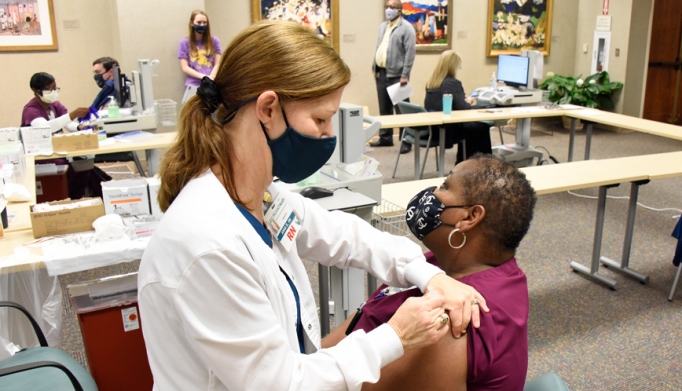McLeod Health Continues to Offer Healthcare Workers COVID-19 Vaccinations as part of DHEC’s Phase 1a Plan

Based on the recommendations of SC DHEC, McLeod Health continues to vaccinate mission-critical healthcare workers based on Phase 1a of the South Carolina COVID-19 Vaccine Plan. General public vaccinations will be announced by DHEC and the CDC as vaccine availability increases.
In this initial phase (1a), DHEC recommends vaccinating frontline workers in a healthcare setting who are at highest risk of contracting COVID-19 and are essential to preventing mortality. If these persons were to become sick and unable to work, healthcare systems could become too overwhelmed to provide care, and mortality would increase.
When 70% of persons identified in Phase 1a have had the opportunity to be vaccinated, DHEC will begin transitioning to Phase 1b. DHEC and enrolled vaccine providers will develop procedures to verify eligibility of people to receive vaccination under this guidance and to coordinate scheduling of vaccinations.
Phase 1a of McLeod Health Employees includes the following groups:
Group 1 includes employees directly caring for COVID-19 patients and all McLeod Health active and affiliate medical staff physicians.
Group 2 includes employees from Inpatient and Outpatient Departments with Direct Patient Care responsibilities.
Group 3 includes all employees, who serve in non-direct patient care departments (this includes students, volunteers, contract workers and vendors who are essential to the flow of business within the hospital.)
McLeod Health is also vaccinating paid and volunteer medical first responders (EMS, fire department, coroners, law enforcement personnel,dentists, dental hygienists and assistants, and pharmacists who provide emergency medical services) and hospital transport personnel in direct contact with suspected and/or confirmed COVID-19 patients.
See below for a more detailed list of Phase 1a mission-critical workers:
- Persons performing direct medical care to suspected and/or confirmed COVID-19 patients: medical house staff (i.e., interns, residents, fellows), nurses, nurse’s aides, physical therapists (PT), physicians, physician assistants, respiratory therapists (RT), speech pathologists providing swallowing assessments during a patient’s infectious period, students (medical, nursing, PT, RT)
- Ancillary staff directly interacting with suspected and/or confirmed COVID-19 patients: laboratory personnel handing potentially infectious specimens, phlebotomists, and radiology technicians
- Emergency room staff in the above categories who provide direct patient care who are at high risk of exposure to undiagnosed, suspected and/or confirmed COVID-19 patients
- Paid and volunteer medical first responders (EMS, fire department, and law enforcement personnel who provide emergency medical services) and hospital transport personnel in direct contact with suspected and/or confirmed COVID-19 patients
- Persons providing direct medical care in correctional facilities
- Persons providing direct medical care in dialysis and infusion centers
- Workers in outpatient medical settings frequently treating persons with suspected or confirmed COVID-19 infection
- Workers in settings where monoclonal antibodies for COVID-19 infusions are given
- Home health and Hospice workers
- Public health nurses/personnel who are frequently interacting with persons with potential COVID-19 infection
- Autopsy room staff, coroners, embalmers, and funeral home staff at risk of exposure to bodily fluids
- Dentists and dental hygienists and assistants
- Pharmacists
These critical workers in high-risk settings will vary in different settings depending in part on the resources within each facility and the communities they serve.
-
McLEOD REGIONAL MEDICAL CENTER FLORENCE
843-777-2000 -
McLEOD DARLINGTON
843-777-1100 -
McLEOD DILLON
843-774-4111 -
McLEOD LORIS
843-716-7000 -
McLEOD SEACOAST
843-390-8100 -
McLEOD CHERAW
843-537-7881 -
McLEOD CLARENDON
803-433-3000



-
McLEOD REGIONAL MEDICAL CENTER FLORENCE
843-777-2000 -
McLEOD DARLINGTON
843-777-1100 -
McLEOD DILLON
843-774-4111 -
McLEOD LORIS
843-716-7000 -
McLEOD SEACOAST
843-390-8100 -
McLEOD CHERAW
843-537-7881 -
McLEOD CLARENDON
803-433-3000
 Find a Doctor
Find a Doctor  Locations
Locations  Services
Services